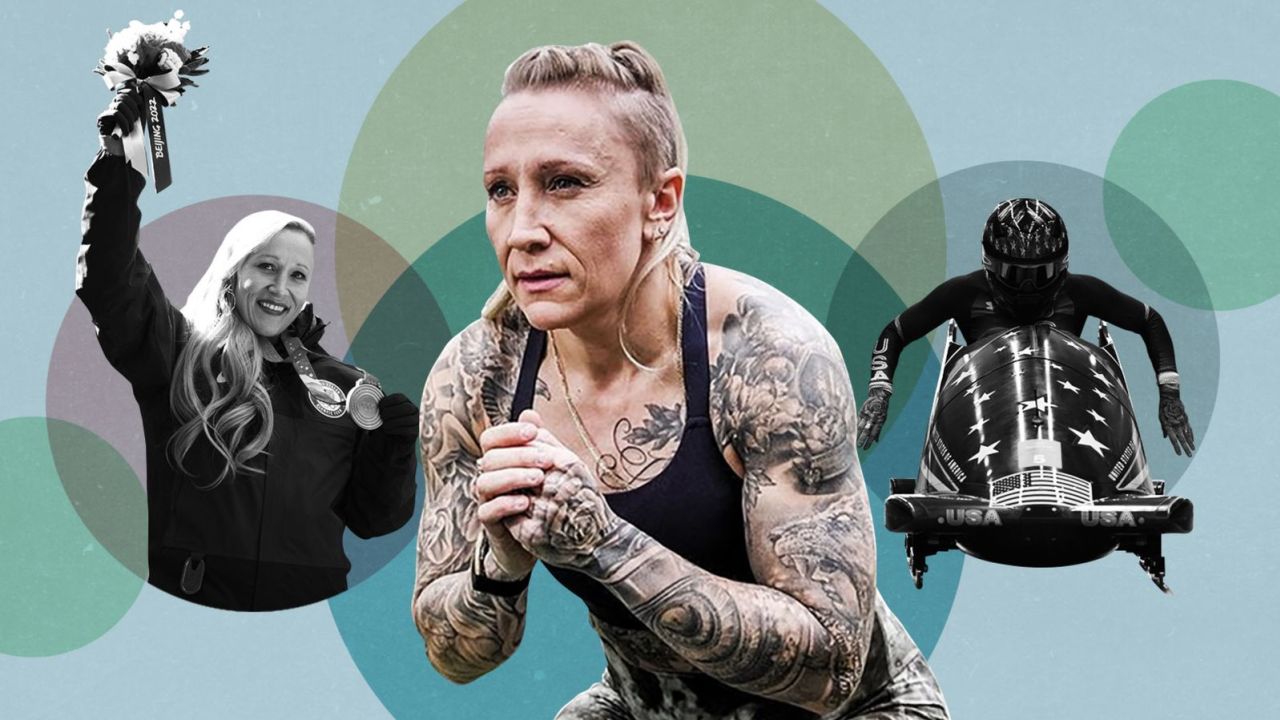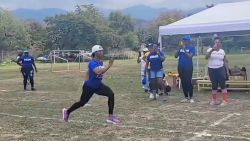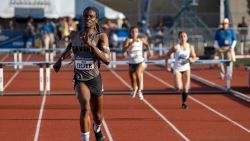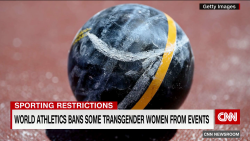Any time Kaillie Humphries wishes, the world’s top female bobsledder can gaze into the mirror and look back on her remarkable career; the artwork that adorns most of her body reminds her of the whole story.
“Tattoos are a big representation of who I am,” the 36-year-old three-time Olympic champion told CNN Sport. “I’ve got my mom and my dad, their portraits. I have Olympic medals, my hopes, goals and dreams. With each one I get, I personally feel more complete.”
But it will require a truly skilled artist to fully capture the latest chapter of her life, an extraordinary drama both on and off the track; an emotional roller coaster which saw her uprooted from Canada, switching her allegiance to the United States.
To do so, Kaillie Humphries had to face her demons and slay the dragon.
It’s been three years since Humphries turned her back on the Canadian team with which she’d won two Olympic titles and 10 World Cup medals.
After 16 years with the national team, she says that her work environment suddenly felt dangerous. “I feared for my physical safety,” she told CNN, adding that whenever she stood up for herself, she feared it could lead to “a punch in the face.”
“It was an environment I feared being in,” she added. “And it culminated in not only depression, but physical issues, rashes, hives. I was having panic attacks.”
Up until 2018, Humphries says she enjoyed working with “amazing coaches” on the Canadian team.
But she says she never got to choose who they were, and in 2018 everything changed at just the time she was hoping to make history at the PyeongChang Winter Olympics.
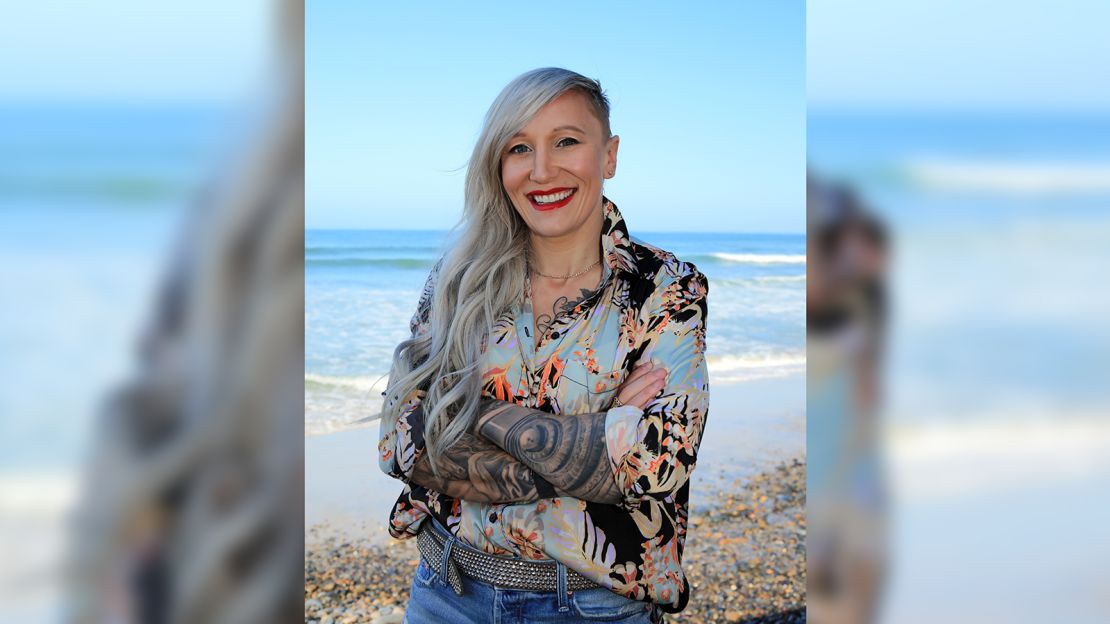
“I went from being the Olympic champion, trying to be the first athlete to defend for three Olympics in a row, to not recognizing myself or wanting to leave the house and being scared for my safety.”
Despite all her considerable success, Humphries says that the arrival of a new coach, Todd Hays, in the lead-up to the 2018 Olympics, led to her being “targeted, harassed and bullied.”
Humphries thought she’d seen it all and was equipped to handle anything that could be thrown at her, but says she was crippled by the anxiety of being forced to work with somebody she found to be aggressive and physically intimidating.
When she filed a complaint against her coach, the President of Canada’s Bobsled and Skeleton governing body (BCS) and another staff member, her concerns were passed to an independent investigator and ultimately dismissed.
Humphries was told that there was insufficient evidence to justify her claims. Humphries then appealed, and according to the New York Times, an arbitrator ruled that the investigation had been inadequate and another inquiry is still ongoing.
Speaking through his attorney, Hays issued a strenuous denial of Humphries’ allegations. He said that contrary to Humphries’ claims, she “made specific demands” that he should be one of her coaches.
Hays’ attorney also rejected any suggestion of impropriety: “At no time has Mr. Hays targeted, harassed, or bullied Ms. Humphries, nor has he acted aggressively or in a physically intimidating manner towards her.”
The statement concluded that Hays would make no further comment, respecting the confidentiality of the ongoing legal proceedings.
“I was courageous enough to stand up and say I felt unsafe,” Humphries said. “And as [with] most athletes in that environment, they’re usually not believed, not trusted and shoved aside.”
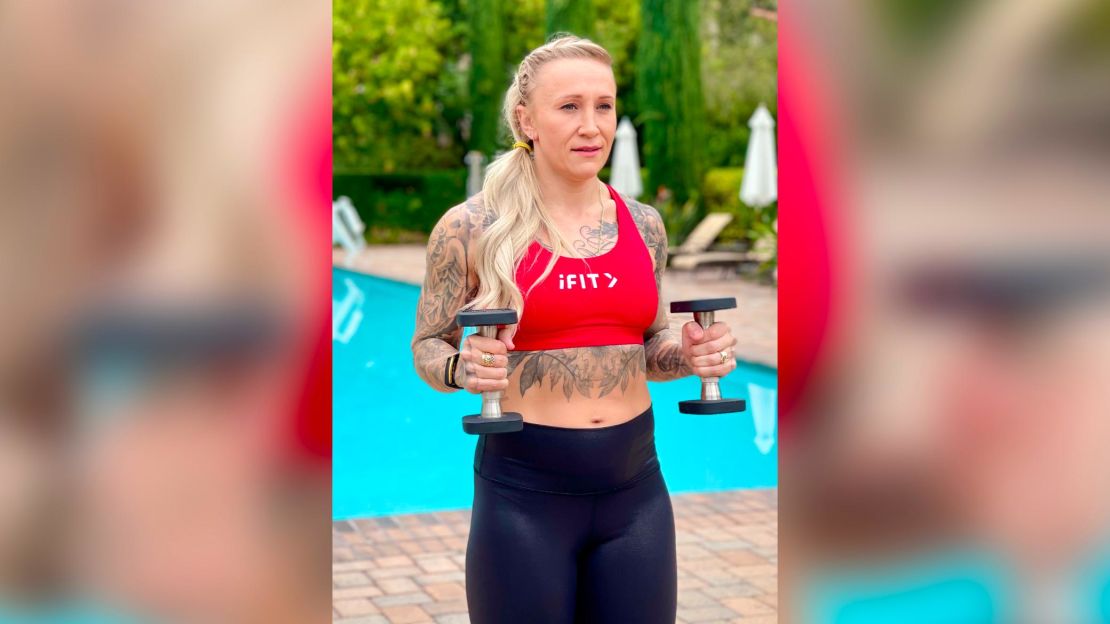
In 2019, Humphries quit the team and decided to race instead for the United States, knowing that it could mean the end of her Olympic dreams.
On March 7, it was revealed that Humphries wasn’t the only athlete with concerns about the working conditions of the athletes in Canada’s bobsled and skeleton team.
More than 60 of them, who have been competing since 2014, signed an open letter, calling for the resignation of senior BCS figures.
They cited a “toxic” environment in what is a dangerous, high-speed sport. The third sentence cut right to the chase: “Too many athletes have suffered physically, mentally, emotionally and financially due to the organization’s failure to address these issues, jeopardizing the future of both sports.”
Humphries responded to the news on Twitter, writing, “I know what these athletes are going through. This is the exact same leadership I dealt with and had to leave to escape it. Proud they are standing up and telling their truths. Change is needed.”
CNN spoke with several sliding athletes, who described their own experience on the Canadian team. They spoke of a culture of negligence and fear of retribution for anybody who dared to raise any concerns.
The retired bobsledder Neville Wright said, “If we keep going in this direction, we’re going to end up in a situation with career or life-threatening injuries and maybe, in the worst case, suicide.”
The retired skeleton athlete Elisabeth Maier says that she has been fighting the federation over claims of harassment and discrimination for four years.
In response, BCS accused her of making “false and gravely defamatory” statements about the organization and issued her with a cease and desist letter.
“When I put in my original complaint,” she recalls, “I went to bed that night hoping I wouldn’t wake up. When someone f**ks with your mental health that heavy and for that long, you believe the worst stuff about yourself.”
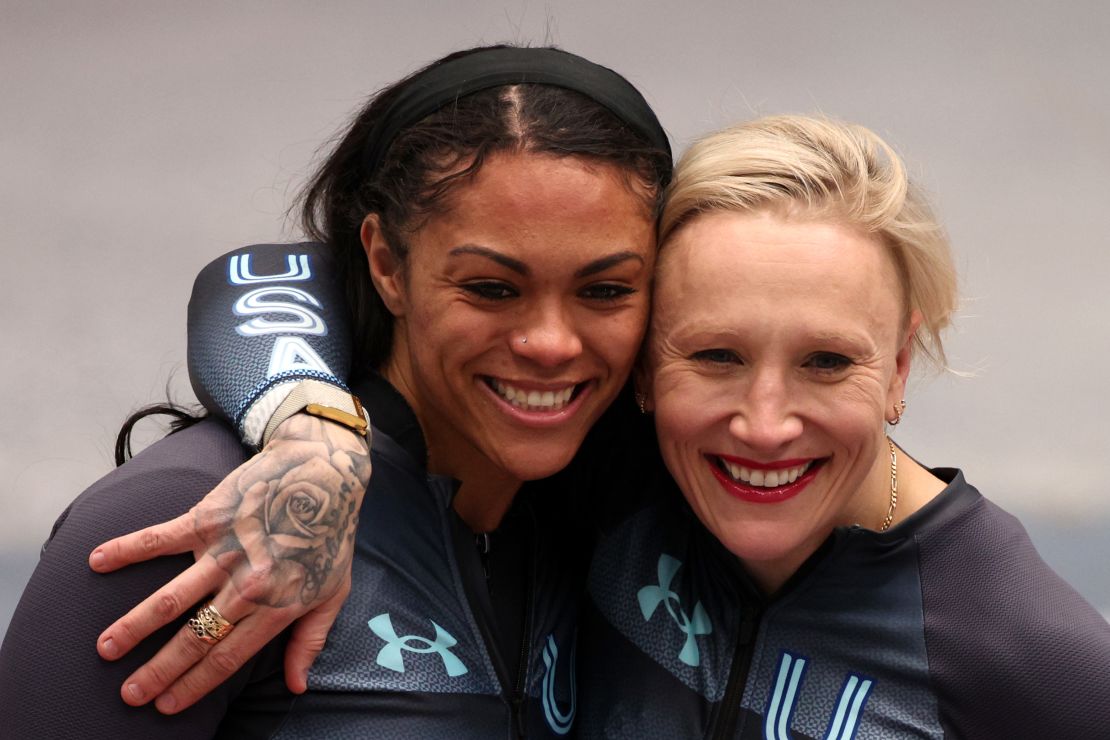
Her voice breaking with emotion, she continued, “There have been three instances where I have genuinely thought about hurting myself or the scary thoughts come in, and they’re all related back to BCS.”
Madison Charney, another skeleton athlete, was also emotional as she recalled her experience on the team.
“We live in a constant state of fear of speaking out against the program, the fear that you’re going to be cut from the program,” said Charney, who added that competing for Canada was like being in an abusive relationship.
“One side is always assuming they’re in the wrong, and always being told they’re sh**ty. They’re wrong, they’ll never be heard, no one will ever believe them. I’m hearing other athletes now say that being cut from the program was ‘the best thing that ever happened to me.’”
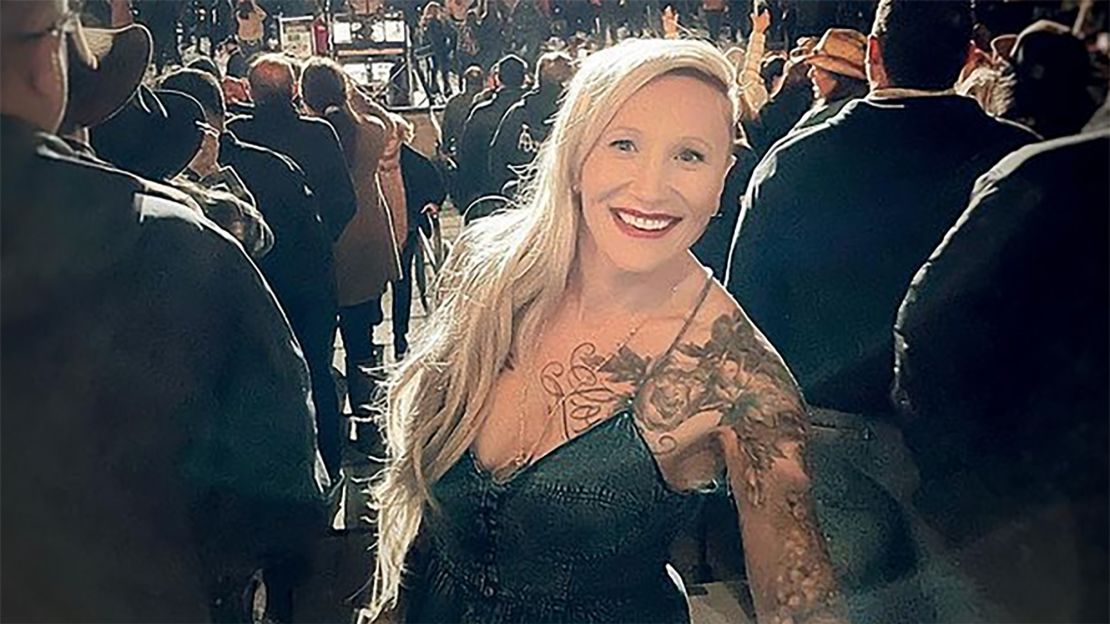
In response to the open letter, BCS issued a statement and said that efforts were already underway to address the issues that had been raised.
“We take the concerns of our athletes seriously,” read the statement. “As we do at the completion of every Olympic quadrennial, we plan to meet with our athlete community directly as soon as possible to review and address their concerns.”
But the athletes quickly dismissed the response from BCS and issued another open letter, revealing that their campaign is also now growing in strength.
This time signed by 82 athletes, they wrote: “Time and again, BCS has controlled the narrative on our complaints and has failed to address the underlying systemic causes of these issues – resulting in further preservation of the status quo.”
The athletes have repeated their demands for a “truly independent” investigation and the immediate resignation of senior BCS figures.
“The BCS Board acknowledges receipt of two anonymous letters from current and former BCS athletes,” said the BCS Board of Directors in statement sent to CNN on March 16.
“We are committed to identifying and resolving the issues brought forward by athletes through a forum that encourages open dialogue and transparency, including the participation of BCS athletes and staff as well as other stakeholders who can bring valuable perspective.
“We believe that constructive dialogue and a clear action plan will bring about positive change. An independent mediation process has been initiated. Athletes will be invited to participate in all aspects, including shaping the mediation process and sharing their views.
“The BCS Board hopes that athletes will participate in this opportunity. As an independent supporter of sport, Own the Podium supports this initiative as a path to encourage discussion and find solutions. We look forward to engaging in meaningful dialogue in a setting that promotes openness and fairness for all.”
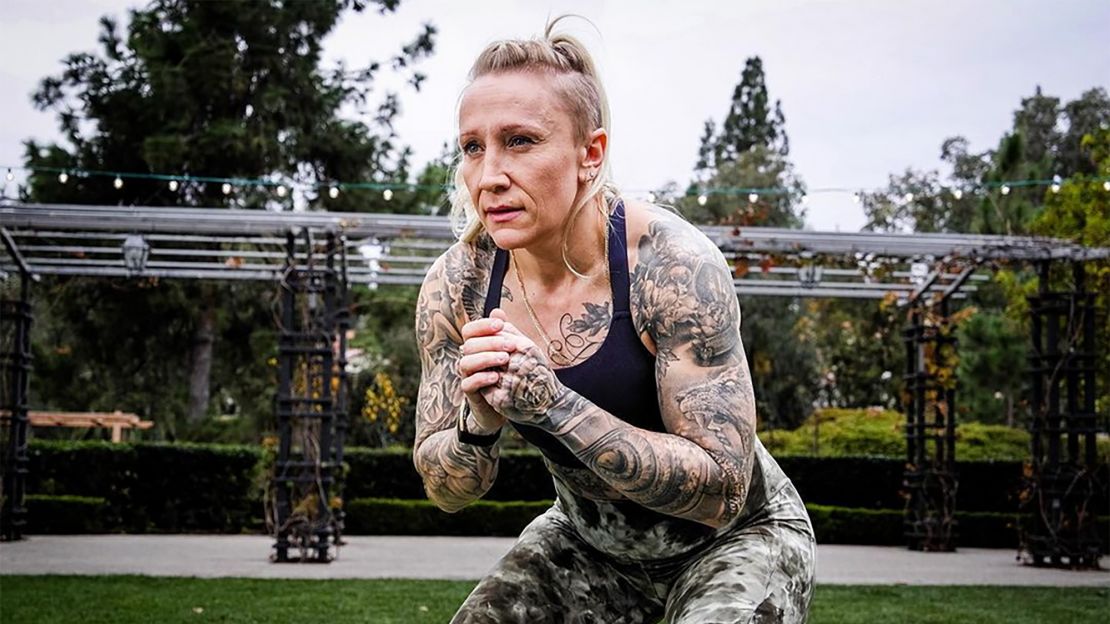
‘Humbling experience’
As the most successful female bobsledder in the business, Humphries went from being on top of the world to rock bottom.
“It was a humbling experience,” she told CNN. “I had to walk away from a long career where I had everything built up, to go back to ground zero. Nothing. No sponsors, no support, no funding.”
She found a home with Team USA – her husband is an American citizen – winning three more world championship titles; but her Olympic status was in limbo.
The International Olympic Committee won’t allow an athlete to compete under the flag of a country unless they hold full citizenship. She’s critical of such rigid regulations, which she says forced her to choose either a safe working environment, or potentially, another shot at the Olympics.
“Why do I have to choose a human right over being able to do my job?” she asked. “The IOC wasn’t willing to bend on that.”
As an athlete, who had spent her life racing against the clock, Humphries was now in a race against time for her citizenship.
“Give me an Olympic performance any day over having to wait for an immigration letter, or answer questions, or submit paperwork. It was extremely nerve wracking, and I’d be lying if I said I didn’t have a couple of meltdowns if it wasn’t for my husband.
“I do not for one second regret the decision I made to leave Team Canada. And I reminded myself of that every single day. I am in a much better place mentally and physically, and if I don’t go to the Olympics, I don’t go.”
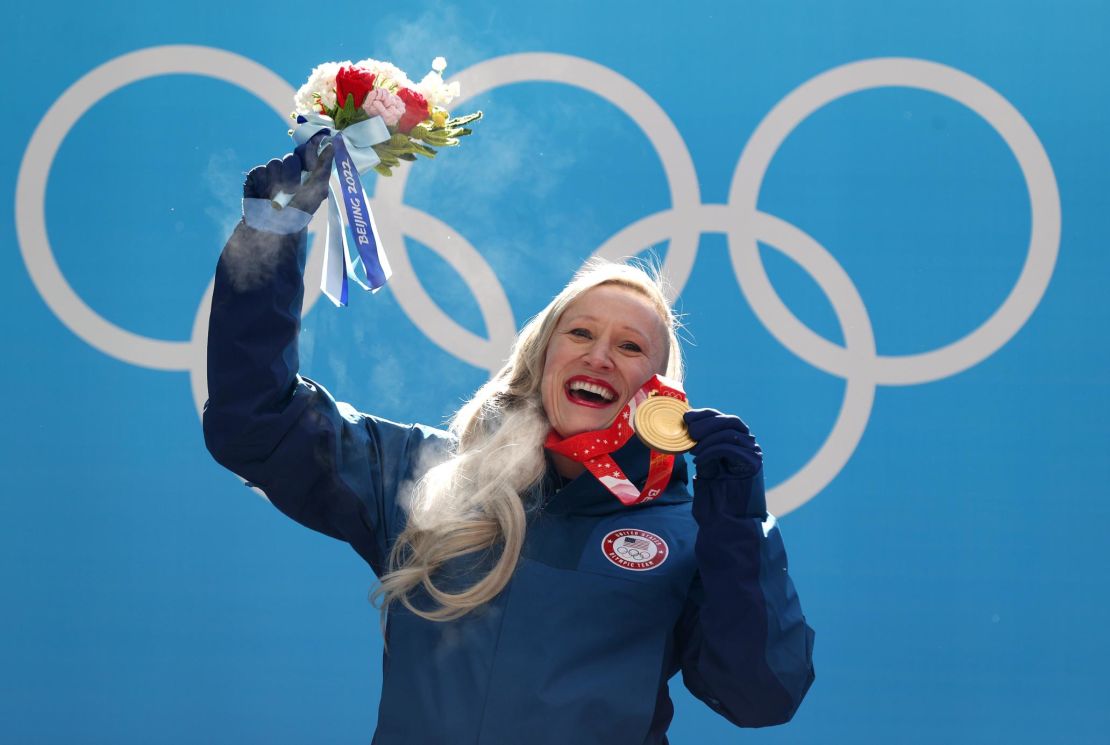
But at the start of December, and with barely two months to go until the Games in Beijing, Humphries became an American citizen. In February, she was an Olympic champion again, winning the inaugural monobob competition.
“I was a lot more emotional than I thought I would be,” she recalled. “There was no guarantee that I would have the opportunity to compete.
“My citizenship came in last minute. I had to have a lot of faith in myself, my family, the program, my sponsors, my support. The community really got behind me and so I definitely felt all that love.”
With the nightmare of her time on Team Canada now fully behind her, Humphries is looking to the future.
She believes that she has at least one more Olympics in her, the 2026 Games in Milan and Cortina d’Ampezzo in Italy, when she’ll be 40. If the 2030 Games end up being hosted by Salt Lake City, she might be persuaded to race one more time and call time on her career on home ice.
But in the meantime, there are more immediate matters: finding the right kind of ink to commemorate the latest chapter of her life in her own personal art gallery.
She says there will be an American theme, naturally, but also a representation of the beast that she slayed.
“The bobsled track in Beijing was called the ‘Flying Snow Dragon’ and I felt like I conquered the dragon while I was there. So I’m probably going to look to get a dragon tattoo.”
It’s an image that could also be a metaphor for everything else that she’s experienced in the last few years.
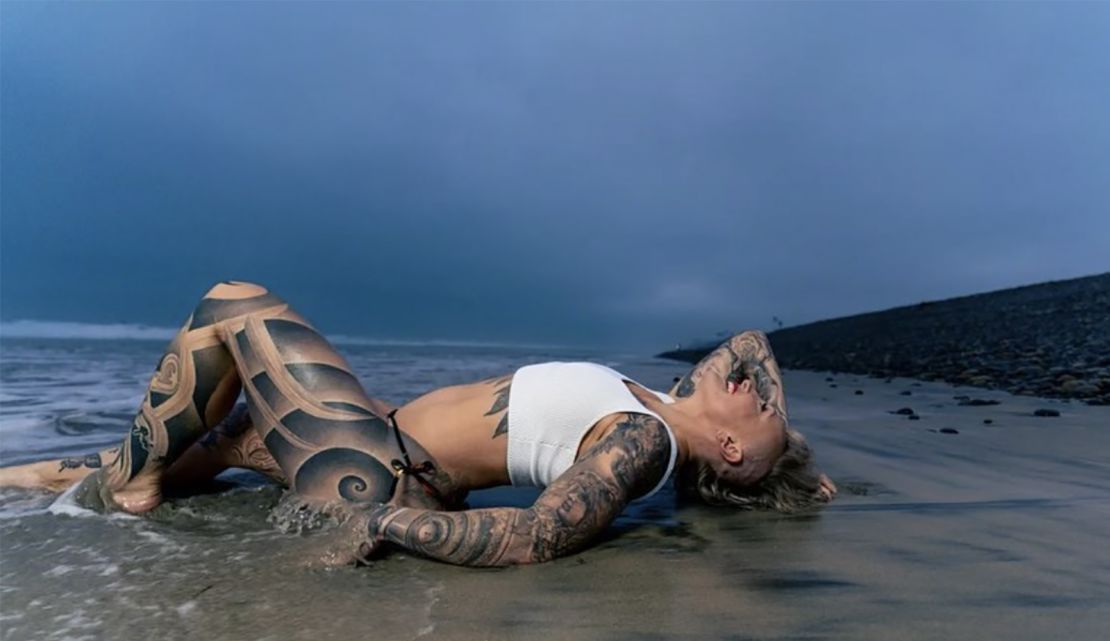
Will it hurt getting the tattoo?
“Yeah, they’re not nice,” she responds, “Kind of like being an athlete. There’s a bunch of pain for a bunch of glory at the end. You can’t have the great things in life without going through some hard times, and tattoos are no exception.”
